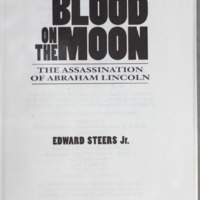-
Title
-
Blood on the moon : the assassination of Abraham Lincoln
-
Description
-
Draws upon primary sources to chronicle the assassination of President Abraham Lincoln and debunk myths that have shrouded the event, covering the planning of the murder and the investigation and executions that followed it.
-
Identifier
-
987511
-
813122171
-
Creator
-
Steers, Edward
-
Source
-
Brian Lamb Booknotes Collection
-
Gift of Brian Lamb, 2011.
-
Catalog record
-
Language
-
eng
-
Date
-
2001
-
Program air date: February 17, 2002
-
Publisher
-
University Press of Kentucky
-
George Mason University. Libraries. Special Collections & Archives
-
Text
-
Transcription of Annotations
Notes from front endpapers: "Otto Eisenschiml. - 5000 military commissions during C.W. - 13,000 people [?]. - Crook's story. - Conspiracy - David George - a.k.a. J.W. Booth. - [?], ok. - died 1903 - exhumation of Booth; 1994: tried for another. - Yellow fever 1864/65: Dr. Luke Blackburn. - Soldier's home - place to kidnap A.L. - How many kidnap plans did confederates have? - New Bern, N.C. - Blackburn killed 2000. - Friar L. Bates, TN lawyer and David E. George - the mummy Henry Ford wouldn't buy, p. 249. - Mistake, p. 75; East Wing, p. 194; p. 67: Mud." -- Annotations by Brian Lamb in the margins and underlining of pertinent phrases throughout the book. -- Examples: p. xv: "Basic research stood on shoulders of James O. Hall, premier researcher." -- p. 2: "The most widely held and egregious myth is that Dr. Samuel Alexander Mudd, the Charles County physician who set Booth's broken leg, was an innocent man persecuted for simply following his Hippocratic Oath." -- p. 7: "Booth was aided by key members of the Confederate underground at every step." -- p. 38: "Lincoln's heinous act calling for emancipation was the first step in stripping away the unwritten rule of "civilized warfare" that held political leaders immune from becoming military targets." -- p. 44: "Lincoln must have realized that burning everything in Richmond and capturing Jefferson Davis could not happen without the loss of civilian life." -- p. 68: "Hatred tied to loss of slaves and land values; tobacco farming." -- p. 95: "When asked what he would do with the rebel leaders, Lincoln said that he would just as soon see them flee the country." -- p. 101: "Fourteen hours later, as Lincoln lay dying, Stanton would abandon Lincoln's policy and issue orders to track down and arrest Thompson along with every other member of the Confederate operation in Canada." -- p. 223: "No matter how one compares the military trial with a civil trial, the real difference between the two forms in July of 1865 was the belief by the government that a civil trial would result in jury nullification due to strong Southern sympathies in the civil population of the District of Columbia."
-
Subject
-
"Lincoln, Abraham, 1809-1865--Assassination."
-
"Booth, John Wilkes, 1838-1865."
-
Relation
-
Original Booknotes interview
-
Rights
-
This work may be protected by copyright laws and is provided for educational and research purposes only. Any infringing use may be subject to disciplinary action and/or civil or criminal liability as provided by law. If you believe that you are the rights-holder and object to Mason’s use of this image, please contact speccoll@gmu.edu.
 987511.pdf
987511.pdf